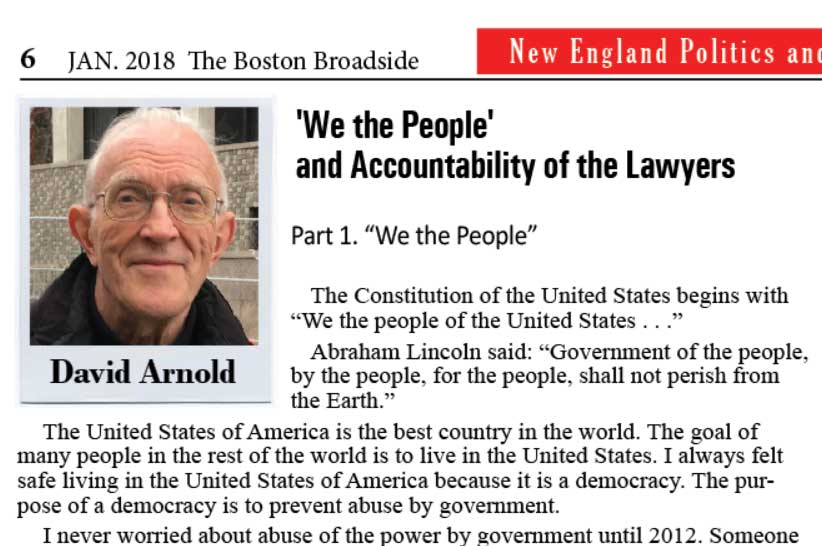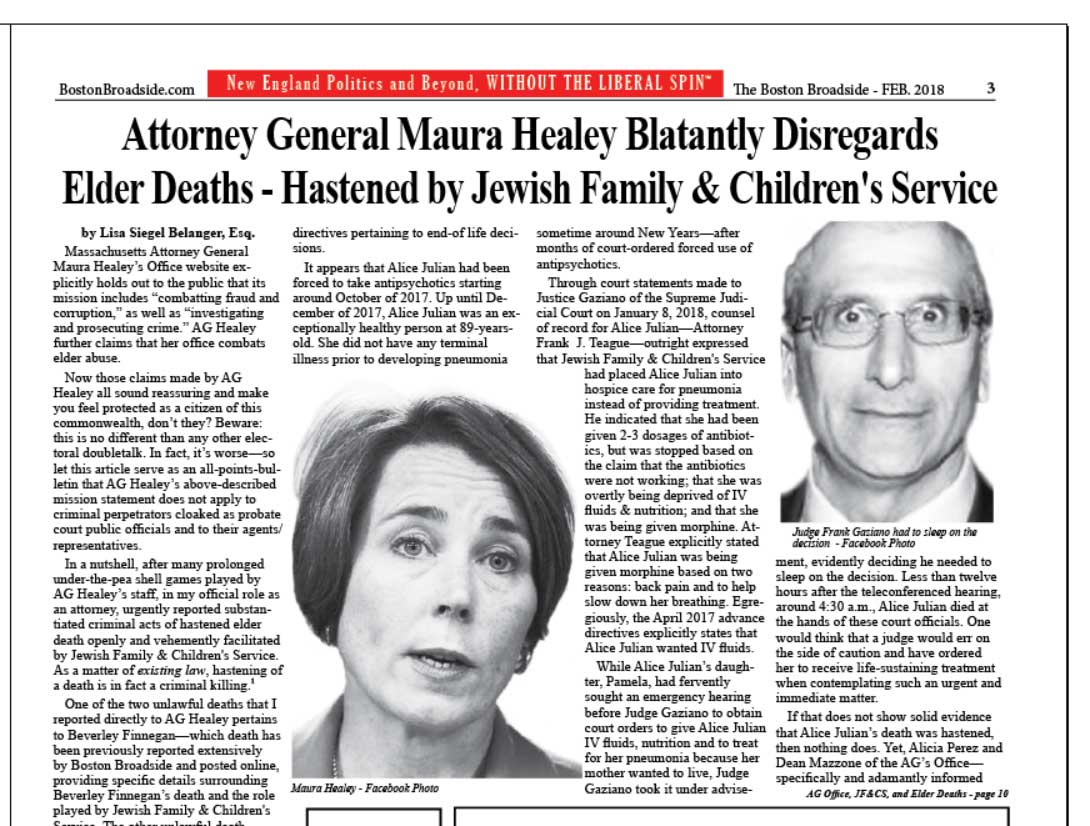‘We the People’
and Accountability of the Lawyers
From the January 1, 2018 printed edition of The Boston Broadside
by David Arnold
Part 1. “We the People”
The Constitution of the United States begins with “We the people of the United States . . .”
Abraham Lincoln said: “Government of the people, by the people, for the people, shall not perish from the Earth.”
The United States of America is the best country in the world. The goal of many people in the rest of the world is to live in the United States. I always felt safe living in the United States of America because it is a democracy. The purpose of a democracy is to prevent abuse by government.
I never worried about abuse of the power by government until 2012. Someone I loved very dearly was subjected to abuse by a professional guardian appointed by the Probate Court. I was also subjected to abuse. In practice, there was no recourse to the power of the guardian. There were no checks and balances. There was no accountability.
People who have been victims of abuse by court-appointed guardians say this is not supposed to happen in a democracy like the United States. This kind of thing only happens in third-world dictatorships. But it does happen. I know. I was a victim.
I kept asking myself how this could happen in a democracy. That question would not go away. It remained unanswered for four years. In 2016, the answer finally came to me out of the blue. The Probate Court is not a democratic institution. It is a dictatorship (see the December 2017 issue #45 of The Boston Broadside, page 3).
Unfortunately, that is not the end of the trail. There is an underlying problem that makes it very difficult to fix the problems with guardianship.
The French philosopher Montesquieu who advocated the idea of three branches of government also pointed out that the personnel of the three branches should not coincide. If the same people or entity control all the branches of government, this negates the checks and balances.
The problem is not hidden. We all have the information needed to understand what is wrong. However, it took me a long time to see the truth that was lying in plain sight. Consider the following:
- The Judicial Branch is controlled entirely by lawyers.
- The Legislature, both state and federal, appears to be about 60 percent
lawyers. - The Office of the District Attorney, which is under the Executive Branch,
is controlled by lawyers. - A disproportionate number of governors and presidents are lawyers.
As the list above shows, the government of the United States is controlled almost entirely by lawyers, not ordinary people from all walks of life. Although the individual people may be different, the same entity – the legal profession – has total control of the Judiciary and the Legislature, and a lot of control over the Executive Branch.
Is our government really “of the people, by the people, for the people”? I guess it depends on how you define “people.”
Suppose we change one word in Lincoln’s famous statement so it reads: “Government of the lawyers, by the lawyers, for the lawyers shall not perish from the earth.” In my opinion, this is much closer to the truth.
In 2011, there were 1.22 million lawyers out of a total population of 311.7 million. This means that 0.4 percent of the total population controls two of the branches of government. The representation of lawyers in the legislature is 150 times greater than their percentage of the total population.
We cannot blame the lawyers for controlling so much of our government. We the people elected them. If this is a problem, we have only ourselves to blame. It is not surprising that so many legislators are lawyers. Knowledge of the law is needed to draft good legislation. On the other side of the coin, the Legislature is supposed to represent the interests of ordinary people from all walks of life, not just lawyers.
The problems with guardianship center around misconduct by lawyers and judges. The problem I ran into is that lawyers seem to control all of the ways that one would file a complaint against the lawyers and judges who are guilty of these abuses. In my opinion, lawyers should disqualify themselves from handling complaints against their professional colleagues on the grounds of conflict of interest. Would there be anyone left if all lawyers disqualified themselves? I have described below what happened when complaints were filed.
After Gretchen died, I filed complaints with all three branches of government. Two other parties also filed complaints to the court, on a website, and in an article published in the September 2017 issue #42 of The Boston Broadside (page 16). None of these complaints had any effect. All these complaints ended up in the hands of a lawyer or a judge who did nothing.
Specifically:
- In 2012, Gretchen’s son and daughter-in-law filed a blistering complaint with Judge Gorman asking for the removal of the professional guardian, Regina Bragdon. Instead of removing the guardian, the judge approved a motion by the guardian’s attorney, Lawrence K. Glick, giving the guardian more authority.
- In 2014, I filed a complaint with the Joint Committee on Elder Affairs of the Massachusetts Legislature. The complaint was handled by Kelly Love, Esq., the director of research for the Committee. She was sympathetic but did nothing. She took another job without leaving any notes on this case.
- In 2015, I filed a complaint with the Middlesex District Attorney. The person I talked to on the phone was a personal friend of the professional guardian Regina Bragdon. The central issue of my complaint was that allowing a guardian to overrule a doctor could enable a guardian to commit an indirect form of homicide by denying necessary care. The neurologists treating Gretchen had to go through college, medical school, and internship. Judge Gorman gave the professional guardian, who had no medical training, authority to overrule all of Gretchen’s doctors. The details of how the guardian kept overruling Gretchen’s doctors are given in the September 2017 issue #42 of the The Boston Broadside (front page). The Office of the District Attorney found no legal grounds for an indictment. The guardian had the legal authority to overrule Gretchen’s doctors.
- In December 2016, I met with my state Senator William Brownsberger to discuss the problems with guardianship. My complaint was against the judge and the lawyers in the case, not just the guardian. I pointed out that as a lawyer himself, Senator Brownsberger was in a position of conflict of interest. I knew the bar association would oppose any reform of guardianship that interfered with the income of its members. I asked Senator Brownsberger to refer my complaint to someone who is not a lawyer. His response was: “I do not practice law and have not practiced for almost 10 years. I have no fear of retaliation from bar associations or others. I serve only my constituents.”
- In 2017, I filed a complaint with the Office of the Chief Justice of the Probate Court. Nothing was done. I was told there is no record of the testimony I gave against the GAL (Guardian ad Litem) and the professional guardian at the trial in February 2013. The Office of the Chief Justice referred me to Bill S.1178/H.3027, saying it was proposed by a group of advocates for the elderly. A close reading of the bill shows that it creates a dictatorship and puts the immunity of guardians into law. Judges already give guardians immunity as “agents of the court.”
Part 2. Accountability of Lawyers
There is nothing wrong with having lawyers in government service. However, the fact that lawyers have so much control over the whole government means that there has to be a good system of accountability for lawyers.
One of the organizations working to stop abuse of power by court-appointed guardians pointed out to me that the legal profession is entirely self-policing. This violates a universally accepted principle of law. No person can be his own judge. No profession or entity can be its own judge.
There are a number of problems with accountability of lawyers:
- Lawyers control the court that is responsible for accountability of all members of society including lawyers. No other profession controls the institution responsible for its own accountability.
- Lawyers are required to report misconduct by other lawyers. I know two lawyers who fulfilled this professional responsibility. In both cases, the lawyer who “blew the whistle” on another lawyer was subjected to severe retaliation by the other lawyer. The court did not just look the other way. The court enabled the retaliation. As one attorney told me: “Attorneys who have a clue are afraid — life is too short . . . very entrenched system.”
- Under the Constitution, the Legislature can impeach a judge. However, the Legislature is controlled by lawyers. This tends to negate the checks and balances intended by the Constitution.
- Review panels for lawyers and judges consist of lawyers, not ordinary people from all walks of life.
Lawyers are a special case because they control the court that is supposed to hold them accountable. The Constitution does not deal with the special case of lawyers. I do not find this surprising. About 60 percent of the delegates to the Constitutional Convention were lawyers.
In my opinion, it is possible to construct a reasonable, practical, effective system of accountability of lawyers:
- Review panels for judges and lawyers should be comprised of ordinary people from all walks of life.
- There should be a system for filing indictments against a lawyer that is not controlled by lawyers.
- The Constitution does not require judges to be professional attorneys. I think there should be judges who are not professional attorneys for the specific purpose of handling cases involving lawyers and judges.
A lawyer may not have the same goals as the client he represents. The practice of law is an occupation of common right. The legal system should be user friendly so people can represent themselves.
Self-policing violates a basic principle of law. It will not work in a culture that does not tolerate whistle blowers. Honest lawyers seem unable to defend themselves against dishonest members of their profession. Lawyers control most of the government. In order to have a true democracy, lawyers need to be accountable to We the People. ♦



